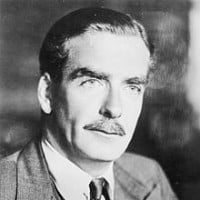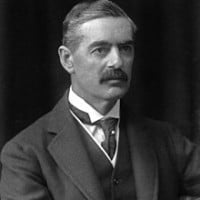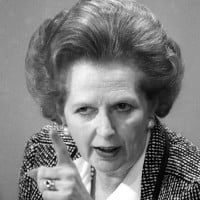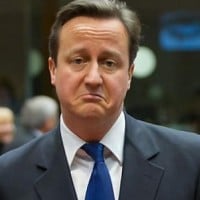Top 10 Worst British Prime Ministers After World War I
Although many people may have biases against Tony Blair or Margaret Thatcher, it's best to vote on which prime minister accomplished the least and was an absolute failure in leadership.

Anthony Eden was a British politician who served as the Prime Minister of the United Kingdom from 1955 to 1957. He is widely regarded as having had a difficult and controversial tenure as Prime Minister, and there are several reasons why he is considered to have failed.
The Suez Crisis: Eden's handling of the Suez Crisis in 1956 is widely regarded as his biggest failure. Eden authorized the invasion of Egypt by British, French, and Israeli forces in response to the nationalization of the Suez Canal by Egyptian leader Gamal Abdel Nasser. The invasion was met with international condemnation and ultimately forced the British to withdraw, damaging the country's reputation and international relations.
Health problems: Eden's tenure was also plagued by health problems, including a chronic illness that required him to take powerful painkillers. His poor health made it difficult for him to effectively lead the country, and he ultimately resigned due to health concerns.
Economic difficulties: Eden's government struggled to address a range of economic problems, including inflation and balance of payment deficits. His government's efforts to address these issues were largely ineffective and contributed to a sense of political and economic instability.
Political infighting: Eden's government was marked by political infighting, both within his own party and between the UK and other countries. This contributed to a sense of chaos and instability in the government and made it difficult for Eden to effectively govern.
Overall, Anthony Eden's legacy is largely defined by his mishandling of the Suez Crisis, which damaged the UK's international reputation and undermined his own leadership. While his tenure as Prime Minister was short-lived, it is still remembered as a period of political and economic turmoil in the UK.
Alec Douglas-Home served as the Prime Minister of the United Kingdom from 1963 to 1964. His tenure was brief, and there are several factors that are considered to have contributed to his failure:
Lack of Public Mandate: Douglas-Home was appointed Prime Minister by the Conservative Party, rather than being elected by the public. This lack of a public mandate made it difficult for him to establish a strong base of support and legitimacy.
Economic Challenges: The UK was experiencing a period of economic difficulty during Douglas-Home's tenure, with rising inflation and balance of payment deficits. His government's efforts to address these challenges were largely seen as ineffective, further undermining his authority.
Unpopular Policies: Douglas-Home's government pursued a number of unpopular policies, including proposals to increase taxes and cut public spending. These policies were widely criticized and contributed to a sense of political unrest.
Opposition from Within His Own Party: Douglas-Home faced opposition from within his own party, particularly from supporters of Harold Macmillan, the former Prime Minister. This internal opposition made it difficult for him to effectively lead the Conservative Party and the government.
Overall, Douglas-Home's tenure as Prime Minister was marked by a lack of legitimacy and a sense of political instability. While he made some efforts to address economic challenges, his unpopular policies and internal party opposition ultimately undermined his leadership and contributed to his failure.
 Theresa Mary May, MP served as Prime Minister of the United Kingdom and Leader of the Conservative Party from July 2016 to July 2019, when Boris Johnson became PM. She has been a Member of Parliament for Maidenhead since 1997. May identifies as a one-nation conservative and has been characterised as... read more
Theresa Mary May, MP served as Prime Minister of the United Kingdom and Leader of the Conservative Party from July 2016 to July 2019, when Boris Johnson became PM. She has been a Member of Parliament for Maidenhead since 1997. May identifies as a one-nation conservative and has been characterised as... read more Theresa May served as the Prime Minister of the United Kingdom from 2016 to 2019, and her tenure was marked by a number of challenges and controversies. Some of the reasons why she is considered to have failed include:
Handling of Brexit: May's government was tasked with negotiating the terms of the UK's exit from the European Union, a process that proved to be extremely difficult and divisive. May's handling of the negotiations was widely criticized by both her own party and the opposition. Her government failed to reach a satisfactory agreement, ultimately leading to her resignation.
Snap election: In 2017, May called a snap election in an attempt to strengthen her party's position in Parliament ahead of the Brexit negotiations. However, the election ended up being a disaster for the Conservatives, who lost their parliamentary majority. This weakened May's position and made it more difficult for her to effectively govern.
Cabinet instability: May's government was marked by a high level of turnover and instability within the Cabinet. A number of high-profile resignations, including that of Boris Johnson as Foreign Secretary, further undermined May's authority and contributed to a sense of political chaos.
Lack of popular support: Throughout her tenure, May struggled to maintain public support. Her government's handling of issues such as healthcare and social welfare were widely criticized, and her personal approval ratings remained consistently low.
Overall, May's tenure as Prime Minister was marked by a number of challenges, particularly relating to Brexit. While she made some efforts to address other policy issues, her government's instability and lack of public support ultimately undermined her leadership and contributed to her failure.

Edward Heath served as the Prime Minister of the United Kingdom from 1970 to 1974. His tenure was marked by a number of challenges and controversies. Some of the reasons why he is considered to have failed include:
Economic Difficulties: Heath's government faced a number of economic challenges, including rising inflation and high unemployment. His government's attempts to address these issues were largely seen as ineffective. The UK's economic difficulties continued throughout his tenure.
Industrial Disputes: Heath's government faced a number of high-profile strikes and industrial disputes, particularly in the coal mining industry. These disputes contributed to a sense of political unrest and undermined the government's authority.
Northern Ireland: Heath's government was also faced with ongoing violence and unrest in Northern Ireland. His government's efforts to address these issues were widely criticized. The situation in Northern Ireland continued to deteriorate throughout his tenure.
Unpopular Policies: Heath's government pursued a number of unpopular policies, including proposals to introduce a wealth tax and to limit wage increases. These policies were widely criticized and contributed to a sense of political instability.
Overall, Heath's tenure as Prime Minister was marked by a number of challenges and difficulties, particularly relating to the economy and industrial relations. While his government made some efforts to address these issues, their policies were largely seen as ineffective. A sense of political unrest and instability continued throughout his tenure.

James Callaghan served as the Prime Minister of the United Kingdom from 1976 to 1979, and his tenure was marked by a number of challenges and controversies. Some of the reasons why he is considered to have failed include:
Economic difficulties: Callaghan's government faced a number of economic challenges, including high inflation and rising unemployment. His government's attempts to address these issues were largely seen as ineffective, and the UK's economic difficulties continued throughout his tenure.
Industrial disputes: Callaghan's government faced a number of high-profile strikes and industrial disputes, particularly in the public sector. These disputes contributed to a sense of political unrest and undermined the government's authority.
Foreign policy: Callaghan's government was criticized for its handling of foreign policy issues, particularly in relation to Rhodesia (now Zimbabwe) and the Iran hostage crisis. Some of his government's decisions, such as its decision to allow the Rhodesian government to continue trading with the UK, were widely criticized.
Political controversies: Callaghan's government was also criticized for its handling of political controversies, particularly the so-called "Winter of Discontent" in 1978-1979, which saw widespread strikes and disruptions to public services.
Overall, Callaghan's tenure as Prime Minister was marked by a number of challenges and difficulties, particularly relating to the economy, industrial relations, and political controversies. While his government made some efforts to address these issues, their policies were largely seen as ineffective, and a sense of political unrest and instability continued throughout his tenure.
Ramsay MacDonald served as the Prime Minister of the United Kingdom on three separate occasions: first from 1924 to 1924, then from 1929 to 1935, and finally from 1935 to 1937. While he is generally considered to have been a successful Prime Minister in some respects, his tenure was also marked by a number of controversies and challenges, particularly in his later years. Some of the reasons why he is considered to have failed include:
Economic difficulties: MacDonald's government faced a number of economic challenges, particularly in the aftermath of the Great Depression. His government's attempts to address these issues were largely seen as ineffective, and the UK's economic difficulties continued throughout his tenure.
Political controversies: MacDonald's decision to form a National Government in 1931, which included members of both his own Labour Party and the opposition Conservative Party, was widely criticized by many members of his own party, who saw it as a betrayal of Labour principles. MacDonald's government was also criticized for its handling of issues such as unemployment and social welfare.
Foreign policy: MacDonald's government was criticized for its handling of foreign policy issues, particularly in relation to the rise of fascism in Europe. Some of his government's decisions, such as its decision to recognize the Italian annexation of Ethiopia, were widely criticized.
Health problems: MacDonald's health began to decline in the latter years of his tenure as Prime Minister, which contributed to a sense of political instability and uncertainty.
Overall, MacDonald's tenure as Prime Minister was marked by a number of challenges and difficulties, particularly relating to the economy and political controversies. While his government made some efforts to address these issues, their policies were largely seen as ineffective, and a sense of political unrest and instability continued throughout his tenure.
Andrew Bonar Law served as the Prime Minister of the United Kingdom from 1922 to 1923. His tenure was brief and marked by a number of challenges. Some of the reasons why he is considered to have failed include:
Health Problems: Bonar Law's health was poor throughout his tenure as Prime Minister. He was diagnosed with throat cancer shortly after taking office. His declining health contributed to a sense of political instability and uncertainty.
Economic Difficulties: Bonar Law's government faced a number of economic challenges, particularly in the aftermath of World War I. His government's attempts to address these issues were largely seen as ineffective. The UK's economic difficulties continued throughout his tenure.
Political Controversies: Bonar Law's government was also criticized for its handling of political controversies. This was particularly in relation to the Irish Question. His government's policies were seen as being too favorable to Northern Ireland and too harsh on the rest of Ireland. This contributed to a sense of political unrest and undermined the government's authority.
Short Tenure: Bonar Law's tenure as Prime Minister was brief, lasting less than a year. This made it difficult for him to implement any significant policy changes or to build a strong base of support within his own party.
Overall, Bonar Law's tenure as Prime Minister was marked by a number of challenges and difficulties. These were particularly relating to his health, the economy, and political controversies. While his government made some efforts to address these issues, their policies were largely seen as ineffective. A sense of political unrest and instability continued throughout his tenure.

It is premature to consider Rishi Sunak's tenure as a failure, as he is currently serving as Chancellor of the Exchequer in the United Kingdom and has not yet completed his tenure. However, it is worth noting that his policies have been subject to criticism and scrutiny, particularly in relation to his handling of the COVID-19 pandemic and the economic fallout from the pandemic. Some criticisms of his policies include:
Insufficient Support for Businesses and Workers: While Sunak's government has implemented a number of support measures for businesses and workers affected by the pandemic, some critics argue that these measures have been insufficient. More needs to be done to support those who have been hit hardest by the economic fallout from the pandemic.
Failure to Address Inequality: Sunak has been criticized for failing to address inequality in the UK, particularly in relation to the impact of the pandemic on low-income households and ethnic minority communities.
Environmental Concerns: Sunak's government has been criticized for its lack of action on environmental issues, particularly in relation to its support for the aviation and fossil fuel industries.
Austerity Measures: Sunak has been a strong advocate for austerity measures, which some critics argue could exacerbate economic inequality and harm the most vulnerable members of society.
Overall, while it is too early to say whether Sunak's tenure as Chancellor of the Exchequer will be considered a failure, his policies have been subject to criticism and scrutiny, particularly in relation to the COVID-19 pandemic and the economic fallout from the pandemic.

John Major served as Prime Minister of the United Kingdom from 1990 to 1997. Some reasons why his tenure is considered to have failed include:
Economic difficulties: Major's government faced a number of economic challenges, particularly in the early 1990s. These included high levels of inflation, a recession, and increasing unemployment. His government's attempts to address these issues were largely seen as ineffective, and the UK's economic difficulties continued throughout his tenure.
Political controversies: Major's government was also beset by a number of political controversies, particularly in relation to Europe. His government was divided over the issue of European integration, and the UK's relationship with the European Union was a source of ongoing tension and conflict.
Party infighting: Major's Conservative Party was plagued by infighting throughout his tenure, which undermined his authority and made it difficult for him to implement his policies. His leadership was challenged by a number of high-profile Conservative politicians, including Michael Heseltine and John Redwood.
Poor electoral performance: Major's Conservative Party suffered a number of electoral defeats during his tenure, including a landslide victory for the Labour Party in the 1997 general election. This was seen as a repudiation of Major's policies and leadership, and he resigned as party leader shortly thereafter.
Overall, Major's tenure as Prime Minister was marked by a number of challenges and difficulties, particularly relating to the economy, political controversies, party infighting, and poor electoral performance. While his government made some efforts to address these issues, these efforts were largely seen as ineffective, and his leadership was ultimately seen as a failure.
 Alexander Boris de Pfeffel Johnson is an English politician, popular historian, and journalist who has served as Prime Minister of the United Kingdom from 2019 to 2022 and Member of Parliament for Uxbridge and South Ruislip since 2015. Johnson previously served as the MP for Henley from 2001 until 2008,... read more
Alexander Boris de Pfeffel Johnson is an English politician, popular historian, and journalist who has served as Prime Minister of the United Kingdom from 2019 to 2022 and Member of Parliament for Uxbridge and South Ruislip since 2015. Johnson previously served as the MP for Henley from 2001 until 2008,... read more Why do I actually find what I see funny?
The worst PM in history? Boris Johnson, by far. He should never be forgiven for locking us down. Such a fool.
What a mess. His Pfeffelisation of life just makes things worse!

 Margaret Hilda Thatcher, Baroness Thatcher, was a British stateswoman and politician who was the Prime Minister of the United Kingdom from 1979 to 1990 and the Leader of the Conservative Party from 1975 to 1990. She was the longest-serving British Prime Minister of the 20th century and was the first... read more
Margaret Hilda Thatcher, Baroness Thatcher, was a British stateswoman and politician who was the Prime Minister of the United Kingdom from 1979 to 1990 and the Leader of the Conservative Party from 1975 to 1990. She was the longest-serving British Prime Minister of the 20th century and was the first... read more David William Donald Cameron is a British politician who is at present the Prime Minister of the United Kingdom, Leader of its Conservative Party, and Member of Parliament for the Oxfordshire constituency of Witney.
David William Donald Cameron is a British politician who is at present the Prime Minister of the United Kingdom, Leader of its Conservative Party, and Member of Parliament for the Oxfordshire constituency of Witney. What a fool! Calling the referendum was the most foolish thing he could have done… and then he went and did it!
 Anthony Charles Lynton Blair, originally known as Anthony Blair, but later as Tony Blair, is a British Labour Party politician, who served as the Prime Minister of the United Kingdom, from 1997 to 2007. From 1983 to 2007, Blair was the Member of Parliament for Sedgefield, and from 1994 to 2007, Blair... read more
Anthony Charles Lynton Blair, originally known as Anthony Blair, but later as Tony Blair, is a British Labour Party politician, who served as the Prime Minister of the United Kingdom, from 1997 to 2007. From 1983 to 2007, Blair was the Member of Parliament for Sedgefield, and from 1994 to 2007, Blair... read more Neither truly Socialist nor Conservative, Blair attempted to impose European-style Social Democracy on the UK where it is not a political tradition. It was this that subsequently caused Brexit.